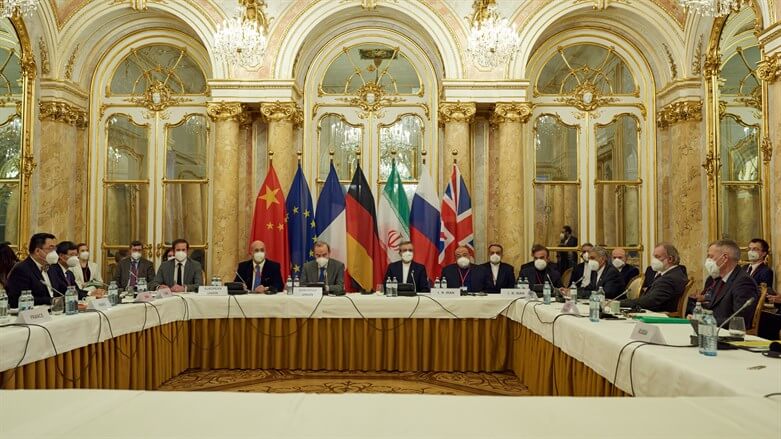As American, European, and Iranian officials continue to hash out negotiations over the 2015 Iran nuclear program, further details about alleged American sanctions concessions to Iran in case of a finalized nuclear agreement are circulating among negotiators and hardline officials in Tehran.
According to a Thursday report, Iran's chief nuclear negotiator, Ali Bagheri Kani, leaked a long list of concessions the United States has allegedly agreed to give Iran in the ongoing nuclear talks. The latest development from the Vienna talks comes as the Islamic Republic continues its assassination campaign against former American government officials and civilians.
According to reports, one of the concessions to Tehran included the discussion of removing the Islamic Revolutionary Guards Corps (IRGC) from the Foreign Terrorist Organization (FTO) list following the revival of the nuclear agreement. Tehran has now agreed to forgo the removal of the IRGC.
American officials have told their Iranian counterparts that the sanctions against IRGC would not affect other sectors and companies. Iran will also be allowed to sell several million barrels of oil in the 120 days with arrangements for receiving the funds through legal banking channels.
The legal sale of crude oil would allow the regime to generate $4 billion for Iran in the first 120 days, allowing the government to have new customers in the global economy. For overseas monetary assets, Tehran will obtain the immediate release of seven billion dollars' worth of frozen assets in several South Korean banks along with the withdrawal of several executive orders made by former President Donald Trump. Some of these executive orders include sanctions on Iran regime-based public institutions like Astan Quds Razavi and others that promote the Islamic regime's ideology.
U.S. officials also allegedly promised domestic laws like the Patriot Act and the Countering America's Adversaries through Sanctions Act (CAATSA) would not impact the nuclear agreement's implementation. Regarding Iran and Russia's uranium trade, American officials stated that the amount of natural uranium Tehran receives from Moscow must double the amount of uranium concentrated power or yellow-cake.
Should a new Republican president come into office and revoke the 2015 nuclear agreement, Biden administration officials have guaranteed that companies working in Tehran until the end of Biden's presidency will remain exempted from American sanctions for two and a half years after the U.S. withdraws. If a Republican president leaves the revived nuclear agreement on the first day in office, companies remain exempted for two and a half years afterward.
On the issue of political prisoners in Iran, American officials have allegedly stated that Tehran will free all U.S. prisoners once the $7 billion worth of overseas assets in South Korea is unfrozen. While no finalized commitments are officially in writing, the concession leaked to media outlets has been of much debate and discussion among Iranian experts and national security analysts, concerned that the President and his team are allowing Tehran to walk all over them.
For his part, Bagheri and other Iranian officials have not provided any concessions or commitments for American officials and have refused to accept the demands in the ongoing Vienna negotiations. Instead, Iranian officials have continued to reject any measures offered by American and European officials, creating confusion and frustration among Western officials managing such talks. Iranian Supreme Leader Ayatollah Ali Khamenei and President Ebrahim Raisi have also vowed that the Islamic Republic will not offer any demands to America and not agree to any international agreement without their consent.
In Congress, Republican and Democratic members of the House and Senate continue to criticize the President and his team for engaging in negotiations with Iran, pointing out that the regime continues to enrich its uranium stockpile to weapons-grade level and support terrorist proxies against allies in the Middle East.
In the past few weeks, the Islamic Republic of Iran has tried to engage in assassination attempts against former Trump administration officials like Mike Pompeo, John Bolton, and others while reinforcing support for attacks against human rights activists and authors like Salman Rushdie.
Experts and analysts have argued instead that the administration should adhere to the advice from Arab and Israeli allies in the Middle East and enact economic sanctions against Tehran's economy while supporting Israeli and Arab military initiatives to deter Iran's aggression. In response to the ongoing nuclear negotiations, Israeli Prime Minister Lapid has called Washington to walk away from such talks and engage in a new strategy against Iran's nuclear ambitions. As the November 2022 Midterms approach, Republicans in the House and Senate are promising to do everything within their power to prevent any concessions from going toward Iran and prohibit any revived nuclear agreement from becoming official.










